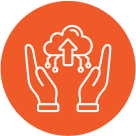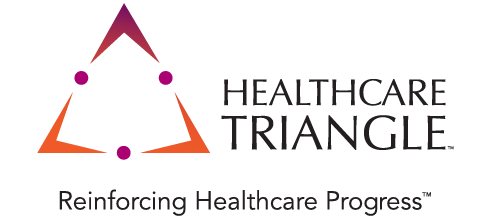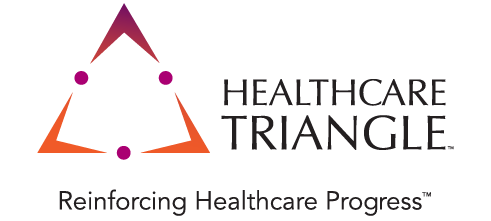Healthcare IT Managed Services
Is your hospital IT overstretched? Let our end-to-end healthcare managed IT services and support team take care of your routine IT tasks and let your IT team focus on strategic priorities.
Modern healthcare provider organizations need to balance their focus between their core strategic initiatives along with the day-to-day support and maintenance of their IT applications. Many times, IT organizations end up with almost exclusively focused on “keeping the lights on” rather than focusing on important strategic projects and innovation. Recruiting, developing and retaining healthcare IT talent is challenging enough without squandering them on mundane, but still important, maintenance tasks.
Being a leading healthcare IT managed services provider, Healthcare Triangle’s managed IT services streamline digital operations, getting your healthcare technology to market faster with huge cost savings.
HCTI’s End-to-End Healthcare IT Managed Services
Our experienced team of experts provide healthcare managed IT services with a flexible remote support model that can free your in-house IT team from day-to-day tasks. We offer end-to-end healthcare application managed IT services and support, with a focus on improving end-user experience, increasing efficiency, and helping you drive results from your strategic IT initiatives.
Healthcare Application Managed IT Services
- Support services to manage EHRs
- Support services for 100+ third party applications (e.g. PACS, OnBase, etc.)
- Legacy support
- New EHR transition services and more…
Technology Provisioning
Why Healthcare Triangle as your Trusted Managed Services Partner?
We offer comprehensive managed services to support healthcare providers’ IT needs. Our Managed It Services for Healthcare can help you handle fluctuations in-demand or backlogs caused by challenges in recruiting and retaining in-house talent. Healthcare Triangle’s managed services offers:
- A cost-effective alternative to expanding your in-house IT team
- A flexible resourcing model that scales as your needs change
- Access to expert advice and technical support
- Peace of mind that allows you to focus energy and resources on your strategic initiatives
- A consistent customer service experience
Healthcare Application Managed Services
We provide:
- Support services to manage EHRs
- Support services for 100+ third party applications (e.g. PACS, OnBase, etc.)
- Legacy support
- New EHR transition services
- And more…


Technology Provisioning
We provide complete Infrastructure as a Service (IaaS), Platform as a Service (PaaS) and also support you in managing specific on premises infrastructure or simple daily tasks like server patching and upgrades, reporting, data center support and testing, etc. depending on your specific technology/application support requirement.
Technology Outsourcing
We take care of holistic IT management in your health IT system. We manage, provision and support any EHR (Epic, MEDITECH, Cerner, etc.) and host in data center or the public cloud depending on your needs.

Leave your Healthcare IT to us and focus on core management initiatives
We provide you with access to clinical, finance and technology experts to support you across applications with a flexible resourcing and pricing model where you choose a blend of resources based on your needs.
Not in need of full Healthcare IT applications support… Get help for tasks you need!

Simplify patient care and compliance with expert IT management

Challenges of Managed Healthcare IT Services

Rising Costs
Increased elaboration of healthcare IT systems has driven up the costs for maintaining and operating them. Most organizations are finding it unsustainable to manage hundreds of systems.

Human Resource
Most health-care organizations face a challenge of finding and retaining the skills needed to manage their entire IT infrastructure.

Compliance Issues
HIPAA and other similar regulations probably present some of the most challenging compliances for any healthcare organization. Nonconformity with such legislation may result in serious penalties and loss of prestige.

Patient Expectations
Patients are increasingly expecting convenience in their healthcare experiences. Such expectations from patients call for reliable and strong IT systems.
The Benefits of Managed Services for Healthcare

Cost Savings
Improved Patient Experience


Enhance Data Security
Seamless Operations


Expertise Availability
Key Managed Services for Healthcare

IT Infrastructure Management

Cloud Hosting

Cybersecurity

Help Desk Support

Backup and Disaster Recovery
Choose the Right Managed Service Provider

Experience
Certified
Service Level Agreements
Security
References

How Managed Services Can Help Your Healthcare Organization
- Free up valuable resources in internal IT and focus them on more strategic projects.
- Leverage expert IT from seasoned MSPs.
- Minimize the chances of IT failures and associated downtime.
- Improve patients' experiences with top-of-the-line IT systems.
Defining Your Goals and Objectives

Key considerations when defining your goals and objectives include the following:

Improve system uptimes
Enhances the reliability and availability of IT infrastructure, reducing disruptions in patient care and operations.

Improved security posture
Protection of sensitive patient data and adherence to industry regulations by taking appropriate measures toward strong security.

Accessing cutting-edge knowledge and strategies
Benefit from the expertise of MSPs to stay updated on the latest healthcare technology trends and best practices.

Leverage cloud solutions
Consider leveraging cloud-based service offerings for better scalability, flexibility, and cost efficiency.

Reduce IT costs with time
Can be visualized as the realization of long-term cost savings through optimized IT operations, resource management, and technology investments.

Customer satisfaction
Covers the improvement or enhancement of patient experiences and an increase in overall satisfaction because of dependable IT support.

Gaining greater financial agility
Make better use of your resources by contracting non-core IT functions to an MSP.

Accelerate CapEx depreciation and amortization
Enhance your financial position by leveraging the services offered by MSPs that will accelerate depreciation and amortization of capital expenditures.

Talent acquisition and leaving risk reduction
Reduces thrills around finding and retaining skilled IT talent through an MSP.
Choose the Right Managed Services Provider
Other crucial factors to consider:

Long-term commitment
Evaluate the stability, reputation, and credibility of the MSP to provide for the growth needs of your organization.

Cultural Fit
The values and approach of the MSP are in line with your HCO culture and priorities.

Collaboration
Observe how much the MSP is ready to collaborate and effectively communicate openly with others.
Vendor Considerations

Similarly, if your organization is using the fully licensed model from MEDITECH, it should take into consideration the amount of support needed based on which hosting platform is chosen.
When selecting an MSP, be sure they currently possess the adequate competence and experience required for your EHR platform and IT infrastructure.
If you consider all these factors with diligence and go in a structured manner, then partnering with managed services will surely help you in optimizing your IT operations, patient care, and achieve long-term savings.
Ready to Learn More?

Our experts can help you assess what your specific needs may be and recommend the best solutions.
Frequently Asked Questions
- 24/7 IT support and monitoring
- Network and infrastructure management
- Data backup and disaster recovery
- Security and compliance management
- System updates and maintenance
- IT strategy and consulting



